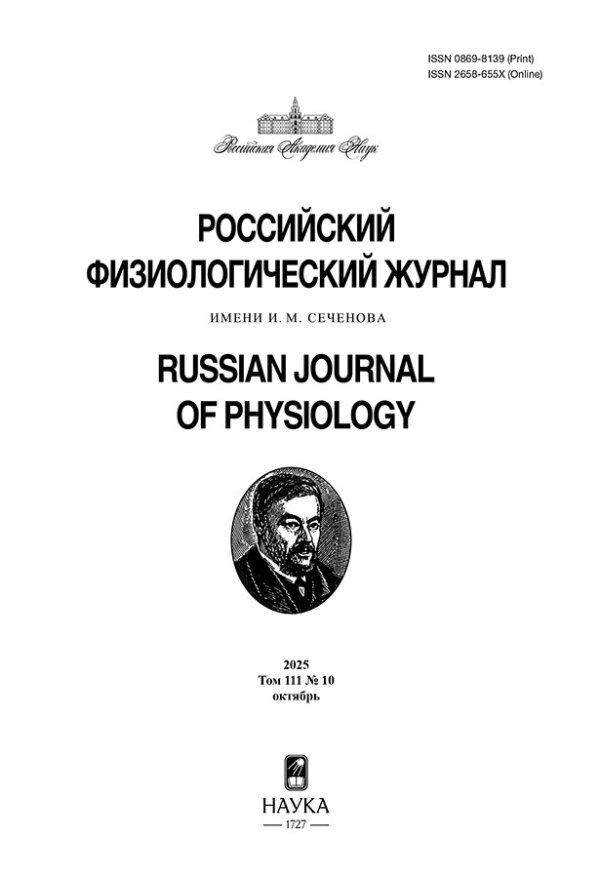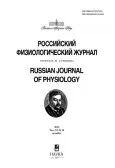The abundance of H3K27me3 histone modification in the mouse colon under chronic inflammation
- Authors: Nickelvart E.A.1, Medvedeva S.S.1, Popova J.V.1, Kozhevnikova E.N.1
-
Affiliations:
- Institute of Molecular and Cellular Biology, Siberian Branch of the Russian Academy of Sciences
- Issue: Vol 111, No 10 (2025)
- Pages: 1601-1614
- Section: EXPERIMENTAL ARTICLES
- URL: https://stomuniver.ru/0869-8139/article/view/696706
- DOI: https://doi.org/10.7868/S2658655X25100029
- ID: 696706
Cite item
Abstract
The prevalence of inflammatory bowel diseases (IBD) has increased globally over recent decades. Following industrialization, the incidence of IBD has been rising not only in European and North American countries but also in Asian nations, including China and India. Despite its widespread occurrence and extensive research efforts, the etiopathogenesis of IBD remains incompletely understood. Epigenetic mechanisms, such as DNA methylation and post-translational modifications of histones, play a crucial role in its pathogenesis. Histone modifications influence chromatin structure and can serve as markers for transcriptionally active or inactive regions. Given the global alterations in gene expression profiles observed in the intestines of IBD patients, it is plausible to hypothesize comprehensive structural changes in chromatin activity and accessibility during intestinal inflammatory processes, affecting both mucosal immune cells and epithelial cells. Particularly, studies utilizing colonic tissue samples from patients with enterocolitis have demonstrated a reduction in the overall levels of trimethylation of histone H3 at lysine 27 (H3K27me3) within epithelial cells. Concurrently, targeting the H3K27me3 modification presents a promising therapeutic approach for IBD through the regulation of transcription in immune cells. This research investigated the presence of this histone modification in epithelial cell nuclei and in colonic tissue as a whole within two mouse models of chronic colitis. Our findings indicate that the overall level of H3K27me3 increases in the nuclei of enterocytes in a chronic colitis model with Muc2 gene knockout. This result suggests that the H3K27me3 modification significantly influences the pathogenesis of IBD, not only in immune cells but also in colonic epithelial cells.
About the authors
E. A. Nickelvart
Institute of Molecular and Cellular Biology, Siberian Branch of the Russian Academy of SciencesNovosibirsk, Russia
S. S. Medvedeva
Institute of Molecular and Cellular Biology, Siberian Branch of the Russian Academy of SciencesNovosibirsk, Russia
J. V. Popova
Institute of Molecular and Cellular Biology, Siberian Branch of the Russian Academy of SciencesNovosibirsk, Russia
E. N. Kozhevnikova
Institute of Molecular and Cellular Biology, Siberian Branch of the Russian Academy of Sciences
Email: kozhevnikova@mcb.nsc.ru
Novosibirsk, Russia
References
- Gajendran M, Loganathan P, Jimenez G, Catinella AP, Ng N, Umapathy C, Ziade N, Hashash JG (2019) A comprehensive review and update on ulcerative colitis. Disease-a-Month 65: 100851. https://doi.org/10.1016/J.DISAMONTH.2019.02.004
- Mak WY, Hart AL, Ng SC (2019) Crohn’s disease. Medicine 47: 377–387. https://doi.org/10.1016/J.MPMED.2019.03.007
- Xavier RJ, Podolsky DK (2007) Unravelling the pathogenesis of inflammatory bowel disease. Nature 448(7152): 427–434. https://doi.org/10.1038/nature06005
- Neurath MF (2014) Cytokines in inflammatory bowel disease. Nature Rev Immunol 14(5): 329–342. https://doi.org/10.1038/nri3661
- Saha S, Müller D, Clark AG (2023) Mechanosensory feedback loops during chronic inflammation. Front Cell Dev Biol 11: 1225677. https://doi.org/10.3389/fcell.2023.1225677
- Jarmakiewicz-Czaja S, Zielińska M, Sokal A, Filip R (2022) Genetic and Epigenetic Etiology of Inflammatory Bowel Disease: An Update. Genes (Basel) 13: 2388. https://doi.org/10.3390/genes13122388
- Ogura Y, Bonen DK, Inohara N, Nicolae DL, Chen FF, Ramos R, Britton H, Moran T, Karaliuskas R, Duerr RH, Achkar JP, Brant SR, Bayless TM, Kirschner BS, Hanauer SB, Nũez G, Cho JH (2001) A frameshift mutation in NOD2 associated with susceptibility to Crohn’s disease. Nature 411: 603–606. https://doi.org/10.1038/35079114
- Liu T, Zhang L, Joo D, Sun SC (2017) NF-κB signaling in inflammation. Signal Transduction and Targeted Therapy 2: 1–9. https://doi.org/10.1038/sigtrans.2017.23
- Ma S, Xu L, Chen L, Sun X, Hu F, Gong Y, Yang R, Li J, Wang Q, Huang S, Zhou H, Wang J (2022) Novel pharmacological inhibition of JMJD3 improves necrotizing enterocolitis by attenuating the inflammatory response and ameliorating intestinal injury. Biochem Pharmacol 203: 115165. https://doi.org/10.1016/J.BCP.2022.115165
- Huang M, Wang Q, Long F, Di Y, Wang J, Zhun Zhu Y, Liu X (2020) Jmjd3 regulates inflammasome activation and aggravates DSS-induced colitis in mice. The FASEB J 34: 4107–4119. https://doi.org/10.1096/FJ.201902200RR
- Liu Y, Peng J, Sun T, Li N, Zhang L, Ren J, Yuan H, Kan S, Pan Q, Li X, Ding Y, Jiang M, Cong X, Tan M, Ma Y, Fu D, Cai S, Xiao Y, Wang X, Qin J (2017) Epithelial EZH2 serves as an epigenetic determinant in experimental colitis by inhibiting TNFα-mediated inflammation and apoptosis. Proc Natl Acad Sci U S A 114: E3796–E3805. https://doi.org/10.1073/pnas.1700909114
- Felice C, Lewis A, Iqbal S, Gordon H, Rigoni A, Colombo MP, Armuzzi A, Feakins R, Lindsay JO, Silver A (2021) Intestinal Inflammation is Linked to Hypoacetylation of Histone 3 Lysine 27 and can be Reversed by Valproic Acid Treatment in Inflammatory Bowel Disease Patients. CMGH 11: 889–891.e6. https://doi.org/10.1016/j.jcmgh.2020.11.009
- Tsaprouni LG, Ito K, Powell JJ, Adcock IM, Punchard N (2011) Differential patterns of histone acetylation in inflammatory bowel diseases. J Inflamm 8: 1–12. https://doi.org/10.1186/1476-9255-8-1
- Goyal N, Rana A, Ahlawat A, Bijjem KR V., Kumar P (2014) Animal models of inflammatory bowel disease: A review. Inflammopharmacology 22: 219–233. https://doi.org/10.1007/s10787-014-0207-y
- Bergstrom KSB, Kissoon-Singh V, Gibson DL, Ma C, Montero M, Sham HP, Ryz N, Huang T, Velcich A, Finlay BB, Chadee K, Vallance BA (2010) Muc2 Protects against Lethal Infectious Colitis by Disassociating Pathogenic and Commensal Bacteria from the Colonic Mucosa. PLoS Pathog 6: e1000902. https://doi.org/10.1371/JOURNAL.PPAT.1000902
- Kim YS, Ho SB (2010) Intestinal goblet cells and mucins in health and disease: Recent insights and progress. Curr Gastroenterol Rep 12: 319–330. https://doi.org/10.1007/S11894-010-0131-2
- Petersson J, Schreiber O, Hansson GC, Gendler SJ, Velcich A, Lundberg JO, Roos S, Holm L, Phillipson M (2011) Importance and regulation of the colonic mucus barrier in a mouse model of colitis. Am J Physiol Gastrointest Liver Physiol 300: 327–333. https://doi.org/10.1152/AJPGI.00422.2010
- Borisova MA, Achasova KM, Morozova KN, Andreyeva EN, Litvinova EA, Ogienko AA, Morozova MV, Berkaeva MB, Kiseleva E, Kozhevnikova EN (2020) Mucin-2 knockout is a model of intercellular junction defects, mitochondrial damage and ATP depletion in the intestinal epithelium. Scient Rep 10: 1–17. https://doi.org/10.1038/s41598-020-78141-4
- Chassaing B, Aitken JD, Malleshappa M, Vijay-Kumar M (2014) Dextran Sulfate Sodium (DSS)-Induced Colitis in Mice. Curr Protoc Immunol 104: 15.25.1–15.25.14. https://doi.org/10.1002/0471142735.im1525s104.
- Zhou J, Huang S, Wang Z, Huang J, Xu L, Tang X, Wan YY, Li Q, Symonds ALJ, Long H, Zhu B (2019) Targeting EZH2 histone methyltransferase activity alleviates experimental intestinal inflammation. Nature Communicat 10: 1–11. https://doi.org/10.1038/s41467-019-10176-2
- Zhou T, Sun Y, Li M, Ding Y, Yin R, Li Z, Xie Q, Bao S, Cai W (2018) Enhancer of zeste homolog 2-catalysed H3K27 trimethylation plays a key role in acute-on-chronic liver failure via TNF-mediated pathway article. Cell Death Dis 9: 590. https://doi.org/10.1038/S41419-018-0670-2
- Toruner M, Unal NG (2023) Epigenetics of Inflammatory Bowel Diseases. The Turkish J Gastroenterol 34: 437. https://doi.org/10.5152/TJG.2023.22515
- Boyd M, Thodberg M, Vitezic M, Bornholdt J, Vitting-Seerup K, Chen Y, Coskun M, Li Y, Lo BZS, Klausen P, Jan Schweiger P, Pedersen AG, Rapin N, Skovgaard K, Dahlgaard K, Andersson R, Terkelsen TB, Lilje B, Troelsen JT, Petersen AM, Jensen KB, Gögenur I, Thielsen P, Seidelin JB, Nielsen OH, Bjerrum JT, Sandelin A (2018) Characterization of the enhancer and promoter landscape of inflammatory bowel disease from human colon biopsies. Nat Commun 9: 1661. https://doi.org/10.1038/S41467-018-03766-Z
- Tao R, De Zoeten EF, Özkaynak E, Chen C, Wang L, Porrett PM, Li B, Turka LA, Olson EN, Greene MI, Wells AD, Hancock WW (2007) Deacetylase inhibition promotes the generation and function of regulatory T cells. Nat Med 13: 1299–1307. https://doi.org/10.1038/NM1652
Supplementary files










